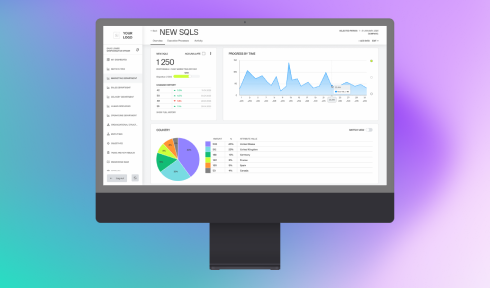The recent healthcare trends are entirely based on technology. Mobile apps, robotics, and AI software are all the key players in how the healthcare industry is transforming. However, a new stage is about to come with the implementation of cloud analytics tools that are expected to bring about major changes to the healthcare system.
New cloud technologies that are equally popular with businesses operating in other fields are mostly focused on improving clinical data management and developing better strategies for patient treatment. There are plenty of cloud services and platforms on the market, each offering its unique ways of data optimization.
The recent healthcare trends say that every clinical setting will be soon in need of cloud-based analytics software, but how exactly cloud analytics will benefit healthcare institutions?
1. Faster deployment
Cloud-based tools typically rely on configurations that allow for quick and effective data integration. Similarly, it does not take much time to produce accurate and error-free analytical insights that cover all the aspects of clinical institution performance.
Another advantage of cloud analytics software is that it peacefully coexists with different software models, including encoding, encryption, and other types. As a result, cloud-based solutions result in the creation of an effective data environment in which a healthcare facility can operate smoothly and effectively with a little risk of making an error.
2. Optimization with AI software
The priority of any clinical organization is to make optimal data-driven decisions, but unluckily, many clinical facilities still build on out-of-dated models that may produce false results and thereby aggravate the patient’s condition. To avoid this scenario, any healthcare organization should opt for cloud tools backed by AI algorithms. The role of AI here is to ensure that both structured and unstructured data are incorporated and used in diagnosing patients and defining methods of treatment.
The AI contribution is also manifested in how massive volumes of data are handled. In particular, AI software identifies basic patterns and design algorithms that enable optimal healthcare service delivery. The use of AI tools eliminates the need for human intervention in data management. Consequently, medical personnel spend less time on reading analytics and instead show better results in clinical operations.

Computools
Software Solutions
Computools is an IT consulting and software engineering company that delivers innovative solutions to help businesses unlock tomorrow. Our clients represent a wide range of industries, including retail, logistics, finance, healthcare, and others.
3. Patient data safety
Cloud security technologies are another reason why medical institutions should think of adopting cloud-based tools. Cloud providers do not only allocate space for storing and processing the customer’s data. They are also responsible for ensuring an enhanced level of data protection against breach, corruption, or leakage.
Cloud service suppliers normally employ different security mechanisms that make it impossible for third parties to violate and hack the customer’s big database. Since an average clinical facility is not able to provide a completely secure and invulnerable environment, the engagement of cloud specialists allows protecting healthcare data from hacking and ransomware more effectively.

4. Democratizing decision-making
The implementation of healthcare data analytics is also beneficial in terms of real-time data processing. Since data are automatically analyzed and systematized, it is much easier to model sound and accurate dashboards relying on which medical professionals can develop a better image of adequate healthcare delivery.
The most advantageous scenario implies that each department has its own dashboard showing clearly in which manner clinical operations should be made to bear the minimum risk of aggravations. Another advantage of dashboards backed by cloud-based analytics is that they help healthcare professionals to make quick and sensible decisions in emergency situations and hence play an important role in boosting patients’ condition and recovery.
5. Reduced costs
Though the adoption of cloud health technologies may cost some money, they eventually lead to a decline in spending on infrastructure. Since a cloud provider undertakes to manage all the challenges related to data management and integration, a medical facility becomes less dependent on facility managers. Besides, improved infrastructure is bound to drive positive results in how patient care is delivered because medical staff will work in a more favorable and well-structured climate where no extra time is wasted on addressing issues arising from bad and ineffective patient data management.
6. Advanced predictive analytics
While it was utterly difficult to predict the development of disease outbreaks even several decades ago, the invention of cloud analytics has made a real revolution in the healthcare industry. Today, advanced predictive analytics is widely used in the healthcare industry as an effective tool allowing medical staff to forecast the future spread of highly contagious infectious diseases. What was very hard to trace in the early 2000s, now can be detected in no time with the help of cloud analytics.
This is how it worked in a case with the recent Ebola outbreak in West Africa. Data analysts were able to control the path of this disease by using the GPS coordinates obtained from cell phones of affected patients.
Moreover, predictive analytics in healthcare finds its place when it is necessary to develop a large-scale vaccination plan, analyze information previous disease outbreaks, handle big data associated with huge genome sequencing databases, and provide effective preventive strategies to combat epidemics and pandemics.
7. Scalability
Cloud technology is also implemented through data analytics applications that let users feel more in control over their health. Such apps allow patients that are not in a hospital to monitor their condition and be notified in case some health problems are about to start. The major advantage of these cloud-based apps is that all the symptoms and changes taking place in the patient’s body are recorded and stored in a large database that can be later accessed by healthcare specialists multiple types until the correct diagnosis is determined. Likewise, the patient can track their health improvements alone and turn to the doctor only when a reverse trend takes effect.
Since this type of healthcare tracking app is available to any individual, this scalability enables doctors to take care of their patients better, while patients themselves are less prone to health risks that they typically face when being not supervised by their healthcare practitioners.
Related Experience

Computools' Product: Scaler
Systemize and scale your business with our intuitive, secure Scaler Cloud Platform - all by yourself, guided by your own business intuition and our proven methodology
Why is cloud analytics catching on?
Cloud solutions can help healthcare organizations overcome many challenges they are currently going through. With the cloud analytics software, clinical institutions have a chance to develop new strategies for delivering patient care rapidly and without difficulties that typically arise from improper data integration. Besides effective and error-free data management, cloud analytics technology creates a secure digital environment shielded from external cyber-attacks and accessible only by individuals authorized to do it.
Cloud solutions promise to start a new amazing epoch in the healthcare industry, but it depends on medical facilities to decide whether they are ready to live a new more secure and less endangered life.
Overcome your facility’s digital challenges by moving to a cloud-based solution. Computools experts can answer any questions at info@computools.com.









“Computools was selected through an RFP process. They were shortlisted and selected from between 5 other suppliers. Computools has worked thoroughly and timely to solve all security issues and launch as agreed. Their expertise is impressive.”